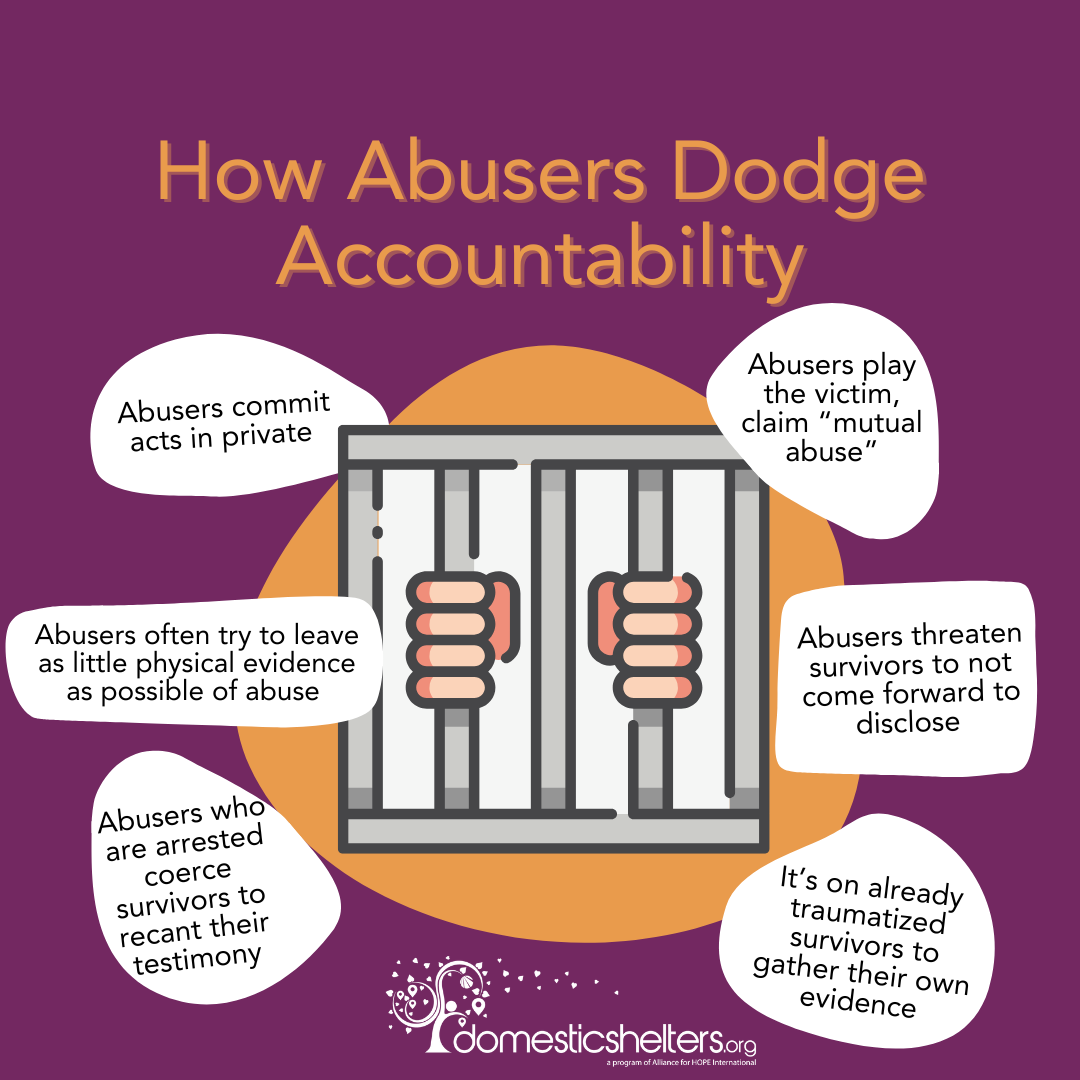1. Select a discrete app icon.

notes
When Domestic Violence Doesn't Lead to an Arrest: Alternate Ways to Get Abusers Behind Bars
Domestic violence cases don’t usually lead to conviction. But other criminal charges may give survivors a path to safety
- Oct 13, 2025

Key Takeaways:
- Domestic violence is hard to prosecute—but other crimes stick. Abusers often avoid convictions for DV, but charges like weapons violations, drugs, fraud, stalking or child endangerment can rely on hard evidence and carry serious penalties.
- Alternative charges can create real windows of safety. Longer sentences for these crimes can remove abusers from the home, giving survivors crucial time to make safety plans, strengthen protections and rebuild their lives.
- Survivors can use incarceration time strategically. Updating safety plans, securing legal protections, improving security, documenting evidence and working with advocates and the system can help increase safety during and after an abuser’s release.
Domestic violence cases don’t often result in arrests or convictions. One major reason for this is that many domestic violence crimes are committed in private. When survivors do report abuse to police, abusers are often careful about making sure to leave as little evidence of their abuse as possible, and to try and paint themselves as victims.
As such, it may be easier to get dangerous abusers behind bars through other criminal charges—like illegal weapons possession, drugs or financial crimes—that are often easier to prove since they rely more on objective evidence, not testimony. These options can lead to arrest, incarceration and time for a survivor to create and execute a safety plan in order to escape.
"Ultimately, using every available legal tool, even charges not explicitly related to domestic violence, can help ensure a dangerous abuser is held accountable and give survivors a chance to rebuild their lives in safety," says Chad D. Cummings, attorney and CPA.
Why Is It So Hard to Arrest Abusers for Domestic Violence?
Domestic violence cases face unique challenges:
- Prosecutors and courts claim that charges are difficult to prove. “Claims of 'mutual violence' or chalking it up to 'he said, she said' are all too frequent," says Carrie Ann Cleveland, LMFT, a trauma therapist.
- The system makes it hard for survivors. “They feel isolated already. They're scared, and it's often up to them to gather their own evidence," says Yosi Yahoudai, co-founder and managing partner at J&Y Law.
- Abusers may use threats or coercion to force victims to recant or change their testimony. This creates a cycle where cases depend on survivor testimony, but the trauma and threats make that testimony hard for survivors to sustain.

What Other Charges Against Abusers Can Be Prosecuted?
Since it can sometimes be tough to prosecute domestic violence, you can look to other criminal activity. Kevin Angelo Brown, PhD, a criminologist and professor at Arkansas State University, points out that this approach makes sense. "Domestic violence is often committed by people who are involved in other criminal behavior."
Many of these crimes can be prosecuted using physical evidence, documentation and third-party witnesses. “Security cameras, phone records, financial statements, ring cameras and electronic monitoring all strengthen a prosecutor's case without putting the burden entirely on the survivor,” Cleveland says.
Here are some common alternative charges that can put abusers behind bars:
Illegal Weapons Possession
Firearms violations are powerful, because they carry serious penalties and can be straightforward to prove. Abusers are often prohibited from owning a firearm because of an order of protection or because they have been convicted of a crime in the past.
“These crimes will be easier to prove, as the victim is not the only witness and there'll be other independent evidence. For example, a police officer could testify to finding a weapon and a data search indicates the abuser doesn't have a license to carry." says Nora Demleitner, a former law professor, and past president at St. John's College.
Drug-Related Charges
If police gain entrance into a home, they can search for evidence of other crimes, such as illegal drugs. And drug possession is easier to prove and convict than domestic violence.
Child Endangerment
If there are children in the home, you may be able to pursue child endangerment, abuse or neglect charges. These charges can lead to both criminal penalties and civil sanctions that can protect children, like supervised visitation or loss of parental rights. The child might confirm the abuse, the child’s injuries could supply proof, third parties might be more willing to come forward to protect a child—such as other relatives or a teacher—or a child's pediatrician might have supportive evidence.
Financial Crimes and Fraud
Since domestic violence often involves financial abuse, these crimes can lead to prosecution. "DV is often about power and control. Forging a partner's signature on checks, opening credit cards in their name without permission, insurance fraud or a variety of others are important issues that can happen and bring more serious charges," Dr. Brown says.
Stalking, Harassment and Restraining Order Violations
These crimes often provide fast protection for survivors. "These charges are easier to prove than domestic violence or intimate partner violence itself, because they rely on objective evidence rather than a survivor's testimony alone. For example, a text message is undeniable proof of a restraining order violation,” Cleveland says.
Other Crimes
Abusers may also be arrested and convicted for:
- Contempt, or failure to appear in court
- Strangulation, which is now a standalone felony in many states (make sure you always seek medical attention after any length of force applied to your neck as symptoms can be delayed)
- Assault
- Criminal threats
- Unlawful restraint
- Kidnapping
- Vandalism
How Long Do These Sentences Last?
Sentences for these charges can vary widely, but they can be much longer than sentences for domestic violence convictions. The length depends on the state, the specific charges and the abuser’s criminal history.
"Serious drug or child abuse charges carry lengthy sentences, and even stalking or aggravated assault are generally punished more severely than domestic violence. In practice, getting an abuser convicted of a weapons or drug offense not only removes them from the home but keeps them away longer, which gives the survivor a much greater window of safety," Cummings says.
"Many of these crimes carry significant potential jail time and other consequences,” Cleveland says.
- Violating a protective order may begin as a misdemeanor but can escalate into a felony with repeat offenses, or if it’s combined with threats or weapons.
- Strangulation, stalking and criminal threats are now often felonies with multi-year sentences.
- Firearms violations, drug trafficking and identity theft often trigger felony-level sentences and harsh penalties.
- Even driving under the influence (DUI) and child endangerment cases bring enhanced sentencing, mandatory treatment programs and strict supervision.
How Can Survivors Use Incarceration Time to Plan for Safety?
The time when an abuser is behind bars gives survivors a window for planning, preparation and escape.
- Create and Update Safety Plans
It's crucial to take steps to help ensure your long-term safety, especially since the time after an abuser’s release is typically dangerous. “The abuser’s incarceration is an important opportunity for a survivor to plan for their future and safety,” Dr. Brown says.
After spending time in jail or prison (which often is short, without proper rehabilitation to make them change their violent ways) they may have built up resentment and might be set on revenge," he says. - Secure Legal Protections
It’s essential to maintain and strengthen legal protections. "When an abuser is locked up, the survivor should not let their guard down. It is important to keep a protective order in place and to inform the jail or prison about it, so staff can block any calls or letters from the abuser,” Cummings says. Report any attempted contact to authorities. - Update Your Security
Incarceration creates a window of opportunity where you can:
- Change all locks on your home and car.
- Update security codes and passwords for any accounts the abuser could access.
- Lock bank accounts and credit cards.
- Keep close friends or family members up to date about what’s going on.
- Consider a confidential address program.
4. Build Evidence for Future Cases
Continue documenting any violations or attempts at contact. "Journal events of abuse and save threatening texts, emails, bank statements and voicemails. Take photos of property damage or injuries. This documentation can be evidence of a variety of different crimes," Dr. Brown says. "Even small violations matter. A single text in violation of a no-contact order builds a pattern of evidence that could lead to stronger consequences. Jail calls are recorded, and those recordings can become powerful evidence of ongoing intimidation or harassment," Cleveland says.
5. Work with the System
Coordinating with the legal system may make your protections stronger. Requesting supervised visitation and firearm surrender orders may align the civil side with the criminal case. Coordinating with probation or parole officers can help ensure they understand your risks and enforce your boundaries.
6. Get Legal Help
Professional legal assistance is crucial for these strategies. "Survivors should work with a domestic violence advocate or attorney to help navigate the legal process and ensure prosecutors consider the abuser's full pattern of misconduct," Cummings says. Professional help can support you beyond the courtroom, so you’re protected even after a sentence is served.
Important: Stay Informed About Release
Be sure to enroll in custody and release notifications so you know about any change in status. "Sign Up for Victim Notification (VINE), which is a free and anonymous system that automatically notifies you by phone or email if an offender is transferred, released or escapes,” Brown says. It can be a dangerous time for survivors when the abuser gets out of jail and wants to reestablish control over a partner.
The Big Picture: Getting Abusers Behind Bars
These charges may not give the same sense of accountability as domestic violence convictions. But they are important strategies that can help protect survivors.
"Pursuing parallel charges is not about 'getting someone on a technicality.' It is about using every available tool to stop the cycle of abuse, build accountability and create safer conditions for survivors," Cleveland says.
Donate and change a life
Your support gives hope and help to victims of domestic violence every day.







